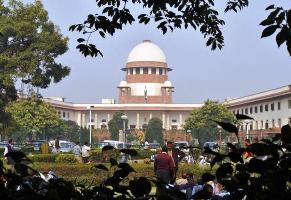 | « Back to article | Print this article |
It is unfair to judge the CAG only by his reports on 2G, KG, Coalgate and the Commonwealth Games, notes Sukumar Mukhopadhyay Does the Comptroller and Auditor General serve the government or the Constitution? The current incumbent, who is due to retire later this month, settled the matter decisively
Does the Comptroller and Auditor General serve the government or the Constitution? The current incumbent, who is due to retire later this month, settled the matter decisively
The Comptroller and Auditor General reports saw senior politicians, powerful ministers and top bureaucrats end up in jail.
Thanks to those reports, public scams such as 2G, Coalgate and the Commonwealth Games became part of the popular discourse.
And no other CAG has polarised the national debate quite so strongly as the current incumbent, who is due to retire on May 23.
In the eye of the public, the CAG has become a deliverer for India’s scam-ridden society.
Did he overstep the mark?
In my opinion, he proved that the CAG is not a servant of the government, but of the Constitution.
He has also proved that the CAG is not a necessary evil but a bulwark of democracy.
And ironically, he was ably helped in highlighting these attributes by the government’s myopic and ill-advised vilification campaign to discredit a constitutional functionary who highlighted the systematic defalcation of public resources and rampant cronyism.
This campaign has had the opposite effect of making his role larger than life.
Let’s consider the various aspect of the CAG’s role: Power to examine policy The role of the CAG received star attraction when the prime minister, in a meeting in June 2011, told editors of leading newspapers that the CAG was going beyond the assigned role in law by delving into policy.
He said this in the background of some CAG observations on policy regarding the allocation of 2G telecom spectrum and the allotment of the Krishna-Godavari gas fields.
Several other ministers also went into overdrive accusing the CAG of trespassing on the jurisdiction of the executive (for example, Kapil Sibal’s statement that there cannot be multiple executives).
Although it is the prerogative of the executive to make policy (as the CAG admitted), the CAG has a specific authorisation in regard to revenue under Section 16 of the CAG’s (Duties, Powers and Conditions of Service) Act 1971.
The constitutional validity of a ‘performance audit’ conducted by the CAG was challenged by one Arvind Gupta by way of a public interest litigation in the Supreme Court.
In its judgment, which came to be known as the Munimji judgment, the apex court observed that ‘the CAG’s function to carry out examinations into [the] economy, efficiency and effectiveness with which government has used its resources is inbuilt in the 1971 Act’.
Nor are these functions violative of the Constitution, since the CAG’s reports are subject to scrutiny in Parliament and legislatures.
It is worth remembering that the CAG is not trying to lay down macroeconomic policies regarding deficit financing or laissez faire.
The CAG’s domain lies in scrutinising the ‘design of the rules and procedures’ that impact receipts of revenue into the Consolidated Fund of India.
And regarding expenditure, Section 13 of the Act certainly permits him to point out wasteful expenditure.
Other performance audits
It is unfair to judge the CAG only by his reports on 2G,